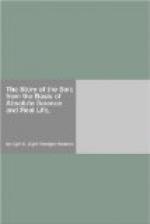“I did not go to college to learn practical farming, if we mean by that the common practice of agriculture,” replied Percy. “I already knew what we call practical farming; that is, how to do the ordinary farm work, including such operations as plowing, planting, cultivating, and harvesting; but it seems to me, Mr. Thornton, that this sort of practical farming has resulted in practical ruin for most of these Eastern lands. The fact is there is a side to agriculture that I knew almost nothing about as a so-called practical farmer, and I am coming to believe that what we commonly call practical farming is often the most impractical farming,—certainly this is true if it ultimately results in depleted and abandoned lands. The truly practical farmer is the man who knows not only how to do, but also what to do and why he does it. The Simplon railroad tunnel connecting Switzerland with Italy is twelve miles long,—the longest in the world. It was dug from the two ends, but under the mountain, six miles from either end, the two holes came together exactly, within a limit of error of less than six inches, and made one continuous tunnel twelve miles long. Now, this was not all accomplished by the practical men who knew how to handle a spade in digging a ditch. The work was controlled by science, and it was known in advance what the results would be. I do not mean that it was known how hard the digging would be, nor how much trouble would be caused by caving or by water; but it was known that if the practical work was done, the final outcome would be successful.
“I think it is even more important that we understand enough of the sciences which underlie the practice of agriculture so we may know in advance that when the practical farm work is done the soil will be richer and better rather than poorer and less productive because of our impractical farming.
“As I said, I did not go to the agricultural college to learn the practice or art of farming; I went to learn the science of agriculture; but, as a matter of fact, I found the college professor knew about as much of practical agriculture as I did and a great deal of science that I did not know. I found that the Dean of the college, who is also Director of the Experiment Station, had been born and raised on the farm, had done all kinds of farm work, the same as other farm boys, had gone through an agricultural college, and after his graduation had returned to the farm and remained there for ten years doing his own work with his own hands. He has had as much actual farm experience as you have had, Mr. Thornton, and ten years more than I have had. He was finally called from the farm to become an assistant in the college from which he was graduated, and in a few years he was advanced to head professor in agriculture. About ten years ago he was made dean and director of the agricultural college and experiment station in my own state; and I have been told that he will not recommend any one for a responsible position in an agricultural college unless he has had both farm experience and scientific training. He and most of his associates are owners of farms and would return to them again if they did not feel that they are of more service to agriculture as teachers and investigators.”




